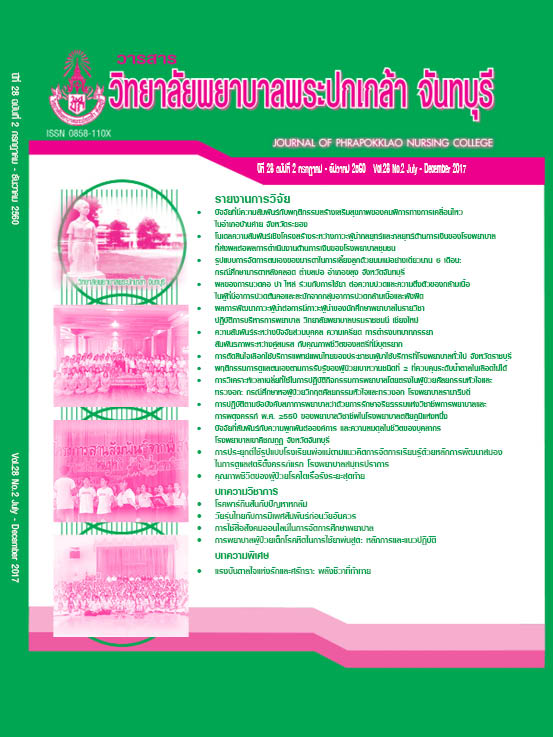Nursing Performance in Relation to Nursing Council Regulations on Professional Ethics of Nurse and Midwifery B.E. 2550 among Professional Nurses in One Tertiary Hospital
Keywords:
Professional nurses, Ethics, Professional nursing values, Motivating factorsAbstract
This cross-sectional research aimed to evaluate nursing performance in relation to Nursing Council Regulations on professional ethics of nurse and midwifery B.E. 2550, and to analyse associations between personal characteristics, professional nursing values, and motivating factors with nursing performance in relation to Nursing Council Regulations among professional nurses. The samples consisted of 393 professional nurses in one tertiary hospital. The research instrument was a four-part questionnaire including personal characteristics of professional nurse, professional nursing values with the reliability of .88, motivating factors with the reliability of .94, and nursing performance in relation to Nursing Council Regulations with the reliability of .78. Data were collected from June 1 to July 31, 2015. Statistics used for data analysis included frequency, percentage, mean, standard deviation, median, Chi-square test, and multiple logistic regression analysis.
The research results revealed that the overall score of professional nursing values was in a good level (92.20%) and the overall score of motivating factors was in a high level (55.80%), while the overall score of nursing performance in relation to Nursing Council Regulations was in a poor level (36.70%). Furthermore, professional nursing values at a good level and motivating factors at a high level were statistically significant associated with nursing performance in relation to Nursing Council Regulations (Adj. OR = 2.81, 95% CI = 1.21-6.63 and Adj. OR = 2.15, 95% CI = 1.26-3.67, respectively).
This research suggested that the administrators should promote professional nursing values and motivating factors. Moreover, training should be organized on nursing performance in relation to Nursing Council Regulations in order to raise awareness of the importance and encourage accurate practice.
References
นิตยา ศรีญาณลักษณ์. (2554). การบริหารการพยาบาล (พิมพ์ครั้งที่ 4). นนทบุรี: โครงการสวัสดิการวิชาการ สถาบันพระบรมราชชนก.
บุญใจ ศรีสถิตย์นรากูร. (2550). ภาวะผู้นำและกลยุทธ์การจัดการองค์การพยาบาลในศตวรรษที่ 21. กรุงเทพฯ: โรงพิมพ์แห่งจุฬาลงกรณ์มหาวิทยาลัย.
พรจันทร์ สุวรรณชาต. (2552). พยาบาลกับการประกอบวิชาชีพที่อาจถูกฟ้องร้องได้. วารสารสภาการพยาบาล, 24(2), 11-13.
พรรณี ขาวเมฆ. (2550). บทบาทการปฏิบัติงานตามมาตรฐานวิชาชีพของพยาบาลวิชาชีพในหน่วยบริการปฐมภูมิ จังหวัดปทุมธานี (วิทยานิพนธ์ปริญญามหาบัณฑิต). กรุงเทพฯ: มหาวิทยาลัยมหิดล.
พาณิภัค โพธิ์เงิน, สุรชาติ ณ หนองคาย, และกิติพงษ์ หาญเจริญ. (2556). การปฏิบัติตามข้อบังคับสภาการพยาบาลว่าด้วยการรักษาจริยธรรมแห่งวิชาชีพการพยาบาลและการผดุงครรภ์ พ.ศ. 2550 ของพยาบาลวิชาชีพในโรงพยาบาลราชวิถี. วารสารวิทยาลัยพยาบาลบรมราชชนนี กรุงเทพ, 29(1), 13-30.
ฟาริดา อิบราฮิม. (2554). สาระทางการพยาบาลเพื่อความรักและความภาคภูมิใจในวิชาชีพ. นนทบุรี: โครงการสวัสดิการวิชาการ สถาบันพระบรมราชชนก.
ภาวิดา พันระกา, กิติพงษ์ หาญเจริญ, ฉัตรสุมน พฤฒิภิญโญ, และนิทัศน์ ศิริโชติรัตน์. (2554). แรงจูงใจกับประสิทธิผลของพยาบาลวิชาชีพในโรงพยาบาลเอกชน. วารสารวิทยาลัยพยาบาลบรมราชชนนี กรุงเทพ, 27(2), 40-49.
รัชนี สินะสนธิ. (2543). ความสัมพันธ์ระหว่างปัจจัยส่วนบุคคล เจตคติต่อวิชาชีพ ค่านิยมต่อวิชาชีพ กับการปฏิบัติการพยาบาลเพื่อพิทักษ์สิทธิประโยชน์ผู้ป่วยของพยาบาลวิชาชีพ งานผู้ป่วยใน โรงพยาบาลศูนย์ โรงพยาบาลทั่วไป เขต 2. วารสารสภาการพยาบาล, 15(1), 1-13.
วรารัตน์ เขียวไพรี. (2553). ความรู้เกี่ยวกับการจัดการ. กรุงเทพฯ: โรงพิมพ์มหาวิทยาลัยธนบุรี.
วิภาดา คุปตานนท์. (2544). การจัดการและพฤติกรรมองค์การ. ปทุมธานี: โรงพิมพ์มหาวิทยาลัยรังสิต.
วริยา ชินวรรโณ. (2546). จริยธรรมในวิชาชีพ. กรุงเทพฯ: โรงพิมพ์ชวนพิมพ์.
สภาการพยาบาล. (2551). แนวทางการส่งเสริมการปฏิบัติการพยาบาลตามจรรยาบรรณวิชาชีพ. กรุงเทพฯ: จุดทอง.
สิวลี ศิริไล. (2551). จริยศาสตร์สำหรับพยาบาล (พิมพ์ครั้งที่ 10). กรุงเทพฯ: สำนักพิมพ์แห่งจุฬาลงกรณ์มหาวิทยาลัย.
อุบลรัตน์ โพธิ์พัฒนชัย. (2550). จริยศาสตร์สำหรับพยาบาล (พิมพ์ครั้งที่ 2). นนทบุรี: โครงการสวัสดิการวิชาการ สถาบันพระบรมราชชนก.
Brown, S. S., Lindell, D. F., Dolansky, M. A., & Garber, J. S. (2015). Nurses’ professional values and attitudes toward collaboration with physicians. Nursing Ethics, 22(2), 205-216.
Daniel, W. W. (2013). Biostatistics: A foundation for analysis in the health sciences (10th ed.). Singapore: John Wiley & Sons.
Fry, S. T. (1994). Ethics in nursing practice: A guide to ethical decision making. Geneva: The International Council of Nurse.
Herzberg, F. (1959). The motivation to work (2nd ed.). New York: John Wiley & Sons.
Scalzi, C., & Mazarey, P. (1989). Values conflict in nursing administration. In Henry, B., Arndt, C., Di Vincenti, M., & Marriner-Tomey, A. (Eds.). Dimensions of nursing administration: Theory, research, education, practice. pp. 583-591. Boston: Blackwell Scientific.
Downloads
Published
How to Cite
Issue
Section
License
Copyright (c) 2017 Journal of Phrapokklao Nursing College

This work is licensed under a Creative Commons Attribution-NonCommercial-NoDerivatives 4.0 International License.
เนื้อความ ข้อมูล และรายการอ้างอิงที่ผู้เขียนใช้ในการเขียนบทความเพื่อลงตีพิมพ์ในวารสารวิทยาลัยพยาบาลพระปกเกล้า จันทบุรี ถือเป็นความคิดเห็นและความรับผิดชอบของผู้เขียน คณะผู้จัดทำวารสารไม่จำเป็นต้องเห็นพ้องด้วยหรือร่วมรับผิดชอบ
บทความที่ได้รับการลงตีพิมพ์ในวารสารวิทยาลัยพยาบาลพระปกเกล้า จันทบุรี ถือเป็นลิขสิทธิ์ของวารสารวิทยาลัยพยาบาลพระปกเกล้า จันทบุรี หากหน่วยงานหรือบุคคลใดต้องการนำส่วนหนึ่งหรือทั้งหมดของบทความไปเผยแพร่ต่อเพื่อวัตถุประสงค์ใด ๆ จะต้องได้รับอนุญาตจากบรรณาธิการวารสารก่อน



